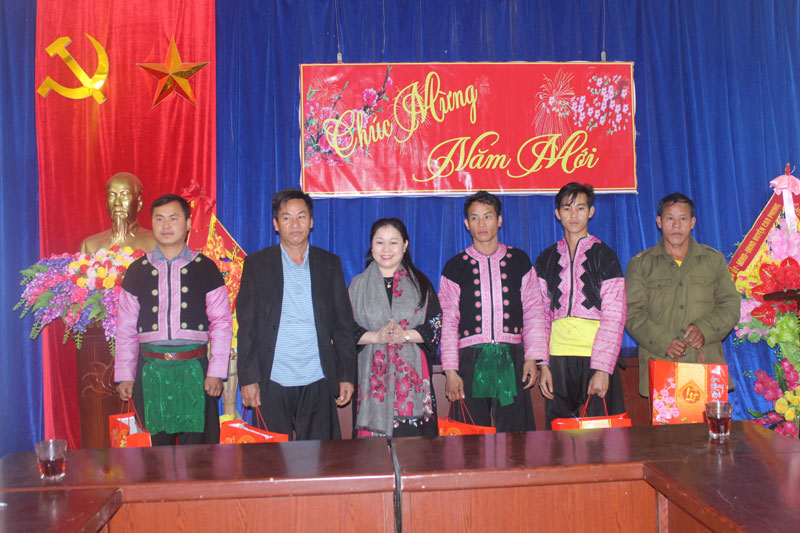
(HBO) - In the morning of January 7, the Hoa Binh provincial ethnic affairs committee and authorities of Mai Chau district presented gifts to Party Committee, authorities, and people of the Thai and Mong ethnic minority groups, ahead of the upcoming Lunar New Year (Tet) and traditional New Year of Mong ethnic people.
 Leaders of the provincial Ethnic Affairs Committee present
Tet gifts to chiefs of villages in Hang Kia commune, Mai Chau district.
Leaders of the provincial Ethnic Affairs Committee present
Tet gifts to chiefs of villages in Hang Kia commune, Mai Chau district.
Leaders of Hang Kia and Pa Co communes also handed over
gifts to five village chiefs and five prestigious persons in Hang Kia commune. In
Pa Co commune, six village chiefs and six prestigious persons also received
gifts.
Leader of the committee wished Party units, authorities and residents
a warm and happy New Year with many contributions to socio-economic
development, fulfilling local political tasks while preserving the Mong ethnic
people’s traditional culture.
In Na Meo commune, leaders of the provincial Ethnic Affairs Committee
and Mai Chau district People’s Committee granted gifts to four hamlets and four
prestigious persons there. In compliance with the National Assembly’s
Resolution, Na Meo commune has merged with Na Phon commune.
In the afternoon the same day, a delegation from the
provincial Ethnic Affairs Committee presented gifts to Party unit and
authorities of Phu Cuong commune, Tan Lac district. They also visited Khanh
hamlet to offer gifts to 12 families hit by disasters in October 2017, each
worth 500,000 VND.
They expressed hope that locals will overcome difficulties
and stabilise their lives. Together with the national target programmes, the
Party and State will design schemes for ethnic minority groups to provide them
with better care in the near future./.
Hoa Binh province is undergoing a dynamic transformation amid Vietnam’s national digital transition. Building on Poliburo’s Resolution No. 57-NQ/TW on breakthroughs in science, technology, innovation, and national digital transformation, the province has rolled out a wide range of practical action plans. A standout initiative is the "Digital Literacy for All” movement, an effort to ensure that no one is left behind in the digital era.
Hoa Binh province is undergoing a dynamic transformation in the wake of the national digital transformation movement. Building on Resolution No. 57-NQ/TW of the Politburo on breakthroughs in science, technology, innovation, and national digital transformation, the province has implemented a wide range of practical action plans. A standout initiative is the "Digital Literacy for All” movement ambitious effort to ensure that no one is left behind in the digital age.
With a spirit of unity and proactive problem-solving, the Party Committee, the government and the people of Dong Lai Commune (Tan Lac District) have made great strides in implementing the resolutions of the 24th Party Congress of the commune for the 2020 - 2025 term. Focusing on leadership and practical actions, the commune has brought the Party’s resolutions into daily life, creating strong impacts and pushing the local development forward.
Amid the nationwide push for digital transformation, young people in Hoa Binh Province are stepping up as dynamic pioneers, applying technology to enhance Youth Union operations and expand the reach of youth-led initiatives. Through creativity and adaptability, Youth Union organizations at all levels have introduced a series of practical solutions, contributing to modern governance and community development.
In recent years, An Nghia commune, located in Lac Son district, has stepped up administrative reform, focusing on improving the quality and efficiency of its single-window service unit for receiving and processing administrative procedures. These improvements have helped create favourable conditions for local residents and organisations to handle administrative procedures, contributing to the commune’s broader socio-economic development.
The Prime Minister-approved master plan to develop the multi-use value of forests ecosystems through 2030, with a vision to 2050, aims to improve the management and sustainable use of forest resources, create jobs, increase incomes, and improve the living standards of ethnic minorities, people in mountainous and remote areas, forest workers and those living near forests.



 Leaders of the provincial Ethnic Affairs Committee present
Tet gifts to chiefs of villages in Hang Kia commune, Mai Chau district.
Leaders of the provincial Ethnic Affairs Committee present
Tet gifts to chiefs of villages in Hang Kia commune, Mai Chau district.